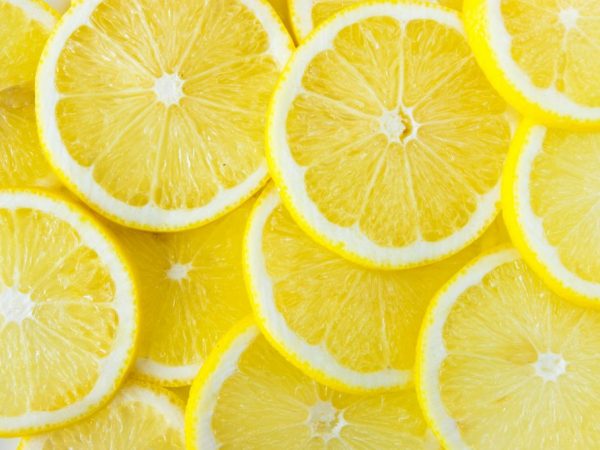The benefits and nutritional value of lemon
Citrus fruits are a huge number of hybrid plants that share similar characteristics. The most famous is lemon. The fruit is rich in vitamins. The calorie content of lemon is low, so people who monitor weight add it to their diet.

The benefits and nutritional value of lemon
Useful properties of lemon
Lemon combines elements with an acidic and alkaline structure. The amount of sugar in the pulp reaches 3%. The presence of pectin, terperine, bioflavonoids has a strengthening effect on the walls of blood vessels. Essential oils, found not only in the fruit, but also in the foliage and bark, help to increase lymph circulation. The production of enzymes and gastric juice is supported by its components, enhances the absorption of calcium and iron.
Lemons are used as a medicine. The juice and peel are saturated with phytoncides, which improve the functioning of the respiratory system and kill pathological microorganisms. They are known for their antiseptic and disinfectant properties. The leaves are often used as an antipyretic.
Those who regularly eat this fruit can boast of fast digestion, lowering blood cholesterol levels, and normalizing metabolic processes. It is able to cleanse the body of toxins.
As a cosmetic, lemon has proven itself in the treatment of eczema and itching. Its features allow you to get rid of birthmarks and freckles, it restores the balance of the skin, maintains its elasticity and youthfulness. Citrus also strengthens hair if they fall out, and nails if there are problems with the nail plates.
Chemical composition of the product
Vitamins and minerals are the main constituents of the lemon tree fruit.
They are presented in a large number and variety.
Vitamins
Lemon is called the leader in the content of vitamin C in the pulp (about 33% of the total daily value for one person in the fruit). But the following groups of substances per 100 g of the product are also referred to the vitamin complex:
- A (2 μg) acts as a strong antioxidant, supports the health of the organs of vision;
- B1 (0.04 mg) keeps the nervous system in good shape;
- B2 (0.02 mg) is useful for skin, hair, tooth enamel, nails;
- B3 (0.008 mg) improves memory and the conduction of nerve fibers in the brain;
- B5 (0.2 mg) acts as a supplier of substances that resists the consequences of stressful situations;
- B6 (0.06 mg) relieves spasmodic contractions of the muscles of the respiratory tract, relieves headaches;
- B9 (9 μg) prevents anemic diseases of the circulatory system, ensures the normal development of the fetus at the beginning of pregnancy;
- C (40 mg) is a support for the immune system and the body's defenses;
- E (0.2 mg) supports the structure of the skin, ensures the prolongation of its youth, takes care of the nervous system;
- PP (0.2 mg) helps to reduce high blood pressure in the vessels, ensures maximum absorption of vitamin C in the body.
Minerals

Lemon contains many nutrients
Minerals are also widely represented. Each of them benefits, affects the functioning of organs and systems.The minerals in lemon include (per 100 g of product):
- potassium (163 mg) is important for strengthening the heart muscle by establishing a rhythm, regulating protein-carbohydrate metabolism, as a result of which edema disappears;
- calcium (40 mg) is responsible for the proper functioning of the muscular system, it is also important for building and strengthening bone tissue;
- phosphorus (22 mg) helps cells in timely division, promotes speedy recovery and renewal of strength after operations and diseases;
- magnesium (12 mg) supports adequate functioning of the nervous system, adjusts the anti-stress barrier, resists atherosclerosis and cardiovascular diseases;
- sodium (1 mg) regulates metabolic processes between cells, normalizes blood pressure, nervous and muscular system, alkaline-acid balance;
- sulfur (10 mg) is involved in the synthesis of many important substances: collagen, hemoglobin, keratin, insulin - promotes the rapid growth of hair and nails, slows down aging;
- chlorine (5 mg) balances the balance of water in the body, activates amylase for proper digestion;
- boron (175 mcg) maintains a person's energy reserve, regulates the work of the visual system;
- zinc (0.13 mg) synthesizes DNA, insulin, male hormones, maintains the skin in a normal state;
- copper (240 mcg) acts against the development of anemia, increases the level of hemoglobin in the blood;
- iron (0.6 mg) carries oxygen atoms with the help of the red elements of the blood.
Energy value and calorie content
The energy value of lemon is an important indicator when determining the amount of product in the human diet per day.
The amount of the product is associated with physical activity, in which the energy released during the assimilation of food can be used. The nutritional value of lemon corresponds to the peculiarity of its use and combination with different products.
Pure citric acid has no indicators of caloric content and energy value. Lemon juice contains proteins in an amount (in grams) of 0.9, carbohydrates - 3, fats - 0.1. The calorie content of the product is 16 kcal. The calorie content of water with lemon is low - 11.6 kilocalories, in which proteins - 0.1 g, fats - 0 g, carbohydrates - 2.9 g.
The number of calories in fresh lemon is 34.46 kcal per 100 g of product, in one fruit about 150 g. The nutritional value of lemon displays the BJU index, which is 10%: 3%: 87%. Proteins in 100 g of citrus - 1.27 g, fat - 0.24 g, carbohydrates - 5.02 g.
Lemon slices without peel have a caloric value of 29.3 kcal, including proteins - 1 g, fats - 0.3 g, carbohydrates - 9.3 g. Lemon peel releases energy in the amount of 47 kcal per 100 grams of zest, it contains proteins - 1.5 g, fats - 0.3 g, carbohydrates - 5.4 g.
The calorie content of lemon with sugar (the energy value of a ripe lemon) is up to 169 kcal. The amount of proteins is 0.6 g, fats - 0.1 g, carbohydrates - 38.7 g. The caloric content of dried lemons has an energy value of 286 kcal per 100 g, including proteins - 4.9 g, fats - 0.4 g, carbohydrates - 74 g. Dried fruits include 254 kcal, of which proteins - 1.8 g, fats - 0 g, carbohydrates - 71 g.
The glycemic index is a measure of the rate at which carbohydrates in food are absorbed by the human body and an increase in blood sugar levels. A high index indicates a rapid use of energy obtained from food, while a low index indicates a high fiber content, then the body burns energy slowly. The glycemic index of lemons is 25 units, which is not a high figure.
Conclusion
Lemon acts as a useful product in the diet of every person, due to the richness of its chemical composition. The calorie content and energy value of ripe lemon allows you to use it both in pure and processed form, in combination with other foods for dietary nutrition.
The energy value of lemon differs depending on the type in which it is consumed. This fruit is indispensable for maintaining health and wellness.


